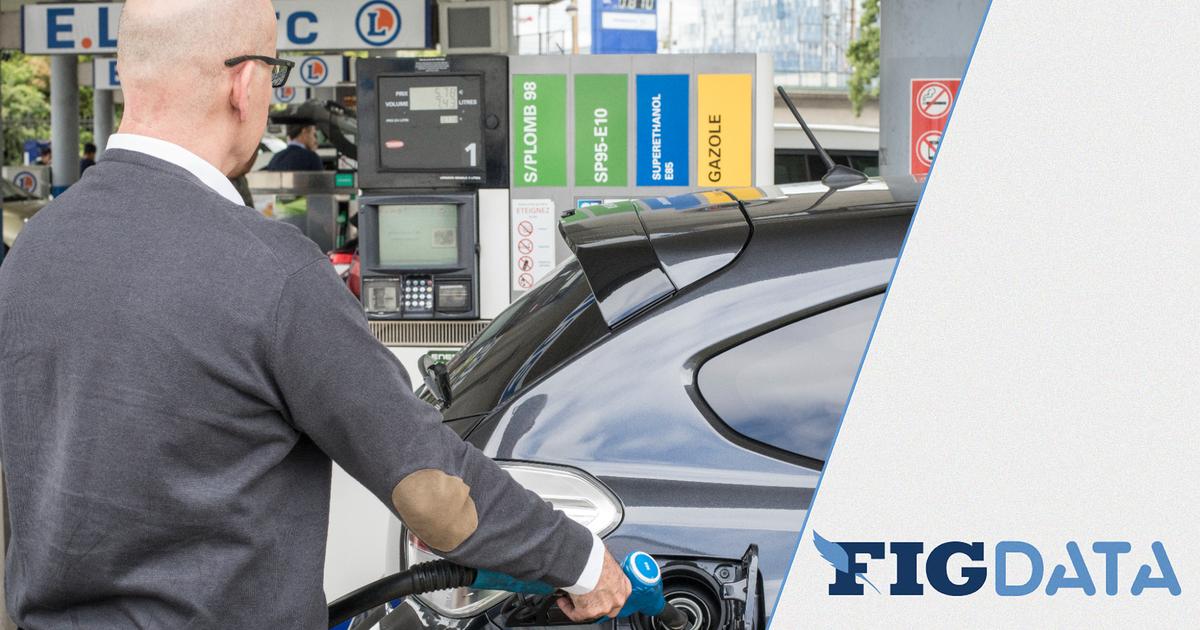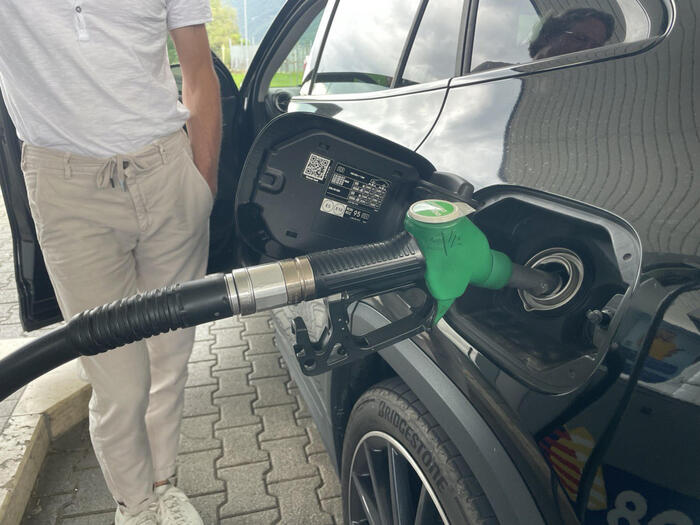The fuel market has not left the zone of maximum tension.
Both gasoline and diesel mark this week in Spain the highest average amount in history, according to data from
the European Union Oil Bulletin
published this Thursday.
The prices that consumers pay at the pump, however, do not reach that record due to the mandatory discount of 20 cents approved by the Government.
But since April 1, when the measure was approved, the rise in fuel prices in the markets has already eaten up a considerable part of that aid: six cents per liter in the case of gasoline and seven cents per liter in the case of of the diesel.
Gasoline has risen 2.2% in the last week and with it exceeds the price of the week of March 14, which until now was its peak.
With 1,878 euros per liter, filling an average tank (55 liters) would now cost 103 euros, although it must be taken into account that with the discount of 20 cents per liter (15 cents at the expense of the State and 5 cents at the expense of the oil companies) that amount would be reduced to 92 euros.
With which, in real terms and without taking into account other discounts that some gas stations have launched with their loyalty programs, refueling right now is approximately the same as in the week of March 7.
As for diesel, which has broken its record for three consecutive weeks, the weekly rise of 2.1% leaves another novelty.
With 1,911 euros per liter on average, the price in Spain exceeds the average of the European Union (1,906 euros), something unusual due to the lower taxation of fuels in Spain compared to other community partners.
If that amount was paid at the pump, refueling a 55-litre tank would cost 105 euros, which after the mandatory discount is 94 euros.
The savings compared to the end of March, the last week before the aid that is valid until the end of June (although it can be extended), is only seven euros.
In the case of gasoline, it is eight euros.
In other words, the rise in prices at origin (before the discount) has already eaten up around a third of the planned aid.
Counting this, gasoline is now 14 cents cheaper than at the end of March and diesel, 13 cents.
This is a circumstance that the Government does not like, as the first vice president, Nadia Calviño, made clear last week.
In an interview on RNE, Calviño assured that the Executive was willing to withdraw measures if she saw that they were not effective.
“If we see that some measure keeps prices up because the operators are absorbing the aid, we will not continue with that aid,” he assured, without specifying if there was any evidence that gas stations are raising prices to take advantage of part of the bonuses.
An ineffective measure
For Antoni Cunyat, Associate Professor of Economics at the UOC, the underlying problem is poor aid design.
“In the first year of Economics it is already taught that when you establish a subsidy, the load falls on the most inelastic part and the subsidy eats up the most elastic part”.
In other words, as many drivers have no choice but to continue refueling, the companies "are keeping part of the subsidy as profits" at a time when prices are not justified by the evolution of
brent
(the reference crude in Europe).
The barrel is around 100 dollars, when in March it had peaks above 130 dollars.
It is the so-called
rocket effect and feather effect
(the increases in the raw material are transferred quickly to the price, but the decreases do so slowly), which for Cunyat is explained "because there is a lack of competition".
An "oligopolistic" hydrocarbons market, the incorrect design of the aid (although similar measures have been approved in other countries such as France) and the shorter path of other countries that started from higher average amounts, explain for the UOC professor that Spain has been above the European average in the average price of diesel.
A situation whose future evolution is difficult to predict because "the context is what it is" and depends on the outcome of the war in Ukraine, the factor that has given an extraordinary boost to prices due to tensions in international markets.
Since the end of December, when the last phase of the price escalation can be located (in reality, these have already risen since last spring due to imbalances in supply and demand in the recovery from the pandemic),
Help carriers
Also this Thursday, the Spanish Confederation of Freight Transport has celebrated the publication of a note from the Ministry of Transport in which it clarifies that the discount of 20 cents on fuel should not be applied in the price review tool.
This is used in the industry to determine the amount of the invoice when there is a significant change in the price of fuel between the day a contract is signed and the day the work is carried out.
The employers of carriers emphasize that, with this methodological note, it is clear that the aid "is a unique and exclusive bonus for the carrier" and protects it from loading companies that "intend to take over the aid that does not correspond to them", including the discount in the revision of the cost of the service.

/cloudfront-eu-central-1.images.arcpublishing.com/prisa/LOID44ZL35C27FIXQ5U7BSEIUY.jpg)












